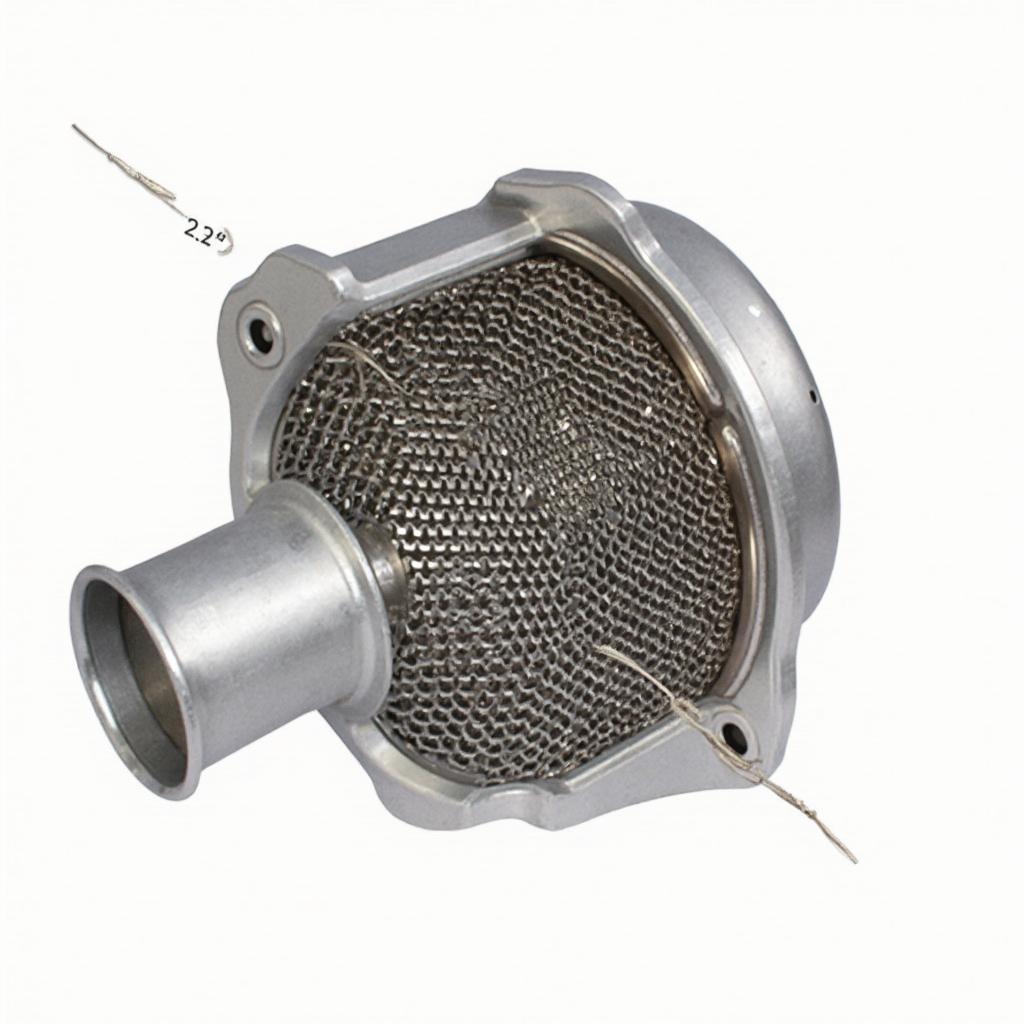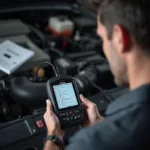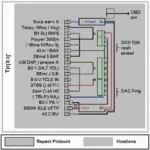Universal 2.25 obd2 catalytic converters are a popular choice for vehicle owners seeking to replace a faulty catalytic converter. They offer a potentially cost-effective solution and are readily available in the market. But what are they, how do they work, and are they right for your vehicle? This comprehensive guide will delve into everything you need to know about universal 2.25 obd2 catalytic converters.
Understanding Catalytic Converters and OBD2 Systems
Before diving into the specifics of universal 2.25″ catalytic converters, it’s important to understand the role of a catalytic converter within your vehicle’s OBD2 system. The catalytic converter is a crucial component of your vehicle’s emission control system. Its primary function is to convert harmful pollutants in exhaust gases, like hydrocarbons (HC), carbon monoxide (CO), and nitrogen oxides (NOx), into less harmful substances like carbon dioxide (CO2), water vapor, and nitrogen. The OBD2 (On-Board Diagnostics II) system monitors the performance of the catalytic converter and other emission-related components. If the OBD2 system detects a problem with the catalytic converter, it will illuminate the check engine light and store a diagnostic trouble code (DTC).
What is a Universal 2.25 OBD2 Catalytic Converter?
A universal 2.25 obd2 catalytic converter is designed to fit a wide range of vehicles, unlike direct-fit converters designed for specific makes and models. The “2.25” refers to the inlet and outlet pipe diameter, a common size for many cars and light trucks. These converters are generally less expensive than direct-fit options, making them an attractive option for budget-conscious consumers.
Advantages and Disadvantages of Universal 2.25″ Catalytic Converters
Universal 2.25″ catalytic converters offer several advantages. Their affordability is a key selling point. They’re also readily available, making them easier to find quickly. However, they also have disadvantages. Installation often requires welding and modifications to the exhaust system, potentially increasing labor costs. Additionally, they may not be as efficient as direct-fit converters, potentially leading to decreased fuel economy or even triggering the check engine light.
How to Choose the Right Universal 2.25″ Catalytic Converter
Selecting the right universal 2.25 obd2 catalytic converter requires careful consideration. First, confirm your vehicle’s engine size and emissions standards. This information is crucial for choosing a converter that meets your vehicle’s specific needs. Consult a qualified mechanic for advice. They can assess your vehicle and recommend the appropriate converter and ensure proper installation.
Common Questions About Universal 2.25″ OBD2 Catalytic Converters
What are the signs of a failing catalytic converter? Common signs include a decrease in fuel economy, a sulfur-like smell from the exhaust, a rattling noise from under the car, and of course, the illuminated check engine light.
How long does a universal catalytic converter last? Like direct-fit converters, universals typically last around 80,000 to 100,000 miles, depending on driving conditions and vehicle maintenance.
Will a universal catalytic converter pass emissions testing? A properly installed and functioning universal 2.25 obd2 catalytic converter should allow your vehicle to pass emissions tests. However, improper installation or an incorrectly sized converter can cause problems.
Is a Universal 2.25″ OBD2 Catalytic Converter Right for You?
Deciding whether a universal 2.25″ catalytic converter is the best choice depends on several factors, including your budget, your vehicle’s specifications, and your willingness to undertake potential modifications. While the lower initial cost is appealing, the added labor costs and potential performance issues can negate the savings.
“When choosing a catalytic converter, remember that a direct-fit converter, while more expensive initially, often saves you money in the long run due to easier installation and optimal performance,” advises Robert Johnson, ASE Certified Master Technician at Johnson Automotive Repair.
Conclusion
A universal 2.25 obd2 catalytic converter can be a viable option for replacing a faulty catalytic converter. However, it’s essential to weigh the pros and cons carefully, considering factors like cost, installation, and potential performance implications. Consult with a qualified mechanic to determine if a universal 2.25″ converter is the right solution for your vehicle.
FAQ
- What does OBD2 stand for? OBD2 stands for On-Board Diagnostics II.
- Why is my check engine light on after installing a new catalytic converter? This could be due to improper installation, an incorrect converter type, or other underlying issues.
- Can I install a universal catalytic converter myself? While possible, professional installation is highly recommended due to the complexities of welding and exhaust system modifications.
- What is the difference between a universal and a direct-fit catalytic converter? A universal converter is designed for a range of vehicles, while a direct-fit is tailored to a specific make and model.
- How can I ensure my universal catalytic converter passes emissions testing? Ensure proper installation and choose a converter that meets your vehicle’s emissions standards.
- What are the symptoms of a clogged catalytic converter? Symptoms include reduced engine performance, poor fuel economy, and a sulfur-like smell from the exhaust.
- Where can I buy a universal 2.25 obd2 catalytic converter? Auto parts stores, online retailers, and muffler shops typically carry universal converters.
Need help with your car’s diagnostic system? Contact us via WhatsApp: +1(641)206-8880, Email: [email protected] or visit us at 789 Elm Street, San Francisco, CA 94102, USA. We have a 24/7 customer support team ready to assist you.


